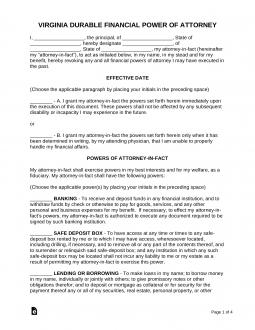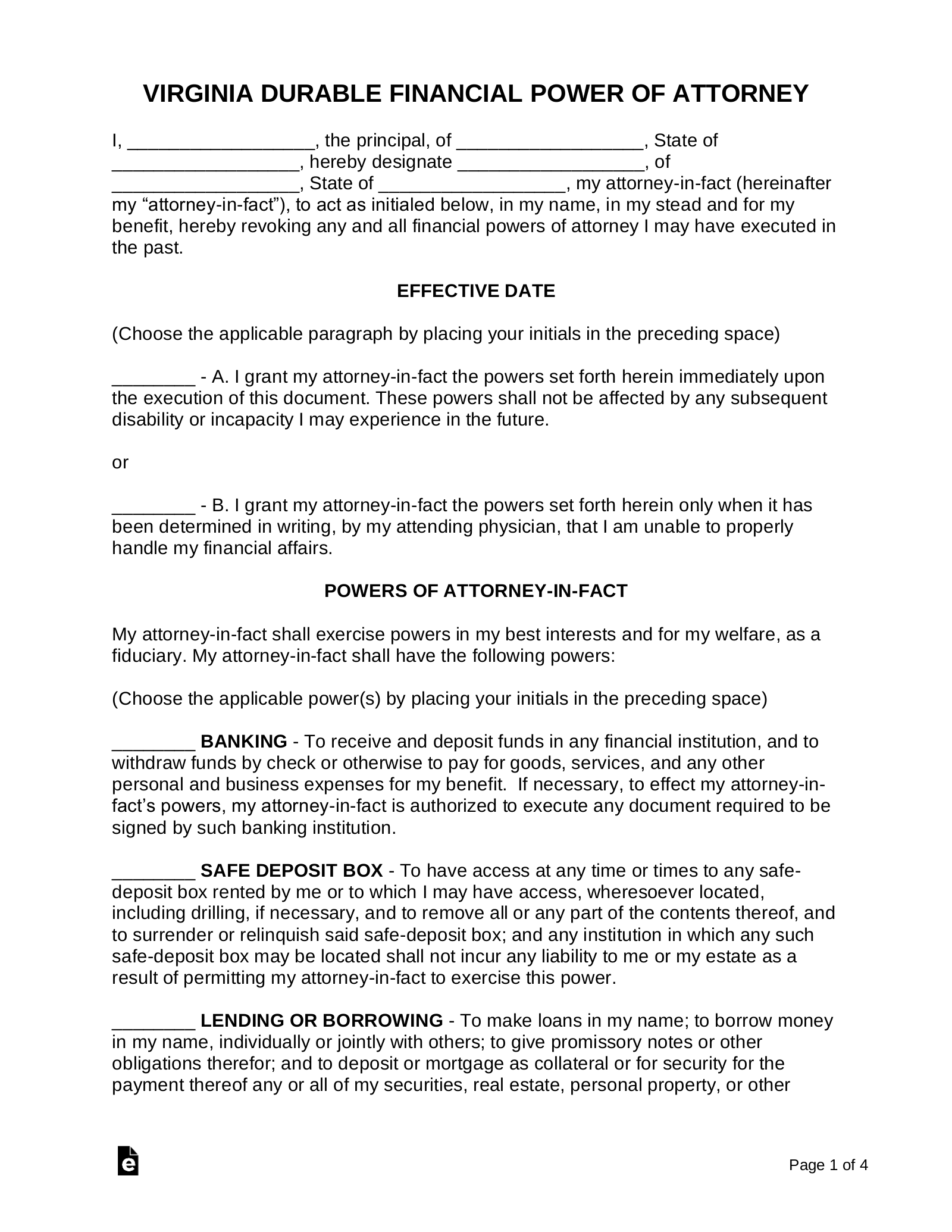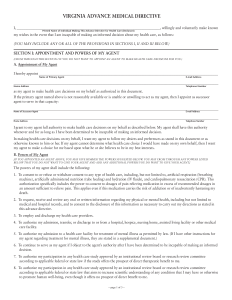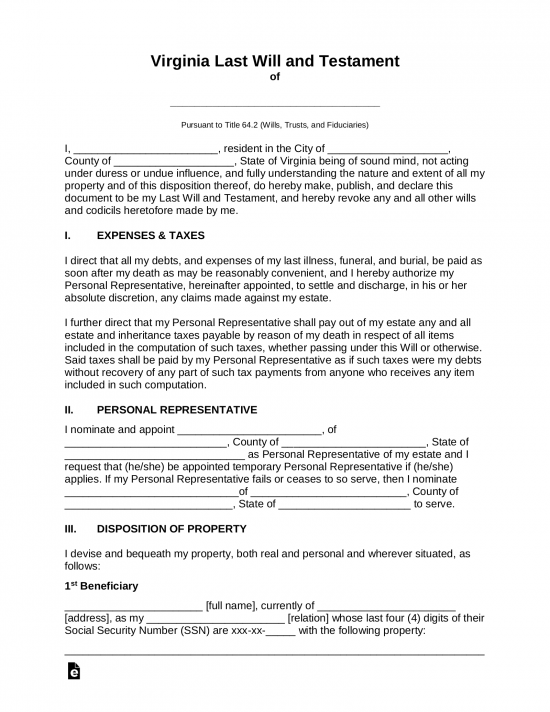Updated October 10, 2023
A Virginia durable power of attorney form provides a method by which a person (“principal”) can designate an individual of their choice (“agent”) to act on their behalf for financial-related matters. This would allow the agent to pay bills, sell and lease property, and act if they were the principal. This is useful for the elderly or anyone who may want someone else to provide assistance and act in their best interest.
Table of Contents |
Laws
Title 64.2, Chapter 16 (Uniform Power of Attorney Act)
Definition of “Durable”
“Durable,” with respect to a power of attorney, means not terminated by the principal’s incapacity (VA Code § 64.2-1600).
Definition of Power of Attorney
“Power of attorney” means a writing or other record that grants authority to an agent to act in the place of the principal, whether or not the term power of attorney is used (VA Code § 64.2-1600).
Signing Requirements
The principal is required to have their signature acknowledged by a notary public or another person authorized by law to take acknowledgments (VA Code § 64.2-1603).
Statutory Form
Virginia has no durable statutory power of attorney, but information regarding durable powers can be found in VA Code § 64.2-1601.
How to Write
Download: PDF, MS Word, OpenDocument
1 – Obtain Paperwork Needed To Appoint Principal Powers In Virginia
This page will present several labeled buttons associated with the preview picture of the required template. Select the caption button labeled with the file type you wish to work with so that you may download a workable copy to your machine
2 – Supplement The Principal’s Introduction With Accurate Party Information
This template will require quite a bit of attention from the Principal. Before documenting the Principal Authority intended for the Attorney-in-Fact, the Principal will have to be clearly presented along with the Attorney-in-Fact. This template will begin with the Principal’s information. Find the first blank space then use it to display the Principal’s Legal Name.  After recording the Principal’s Name, the following two empty lines request the Street Address where the Principal lives then the State where he or she lives. Furnish this information on these lines in that order.
After recording the Principal’s Name, the following two empty lines request the Street Address where the Principal lives then the State where he or she lives. Furnish this information on these lines in that order. The Attorney-in-Fact should also be introduced here. Three empty lines have been placed after the phrase “Hereby Designate” so that you may adequately produce the Full Name, Residential Street Address, and State (in this order).
The Attorney-in-Fact should also be introduced here. Three empty lines have been placed after the phrase “Hereby Designate” so that you may adequately produce the Full Name, Residential Street Address, and State (in this order).
3 – The Start Date Of The Terms In This Paperwork Requires Principal Definition
The next area that must be tended to in this document needs the Principal to approve the way the Attorney-in-Fact will receive the Authority the Principal wishes designated. He or she may decide to have these Principal Powers go into effect on the Signature Date of this document by initialing statement A or the Principal may opt to postpone its effect until he or she is determined to be incapacitated by a Physician by initialing statement B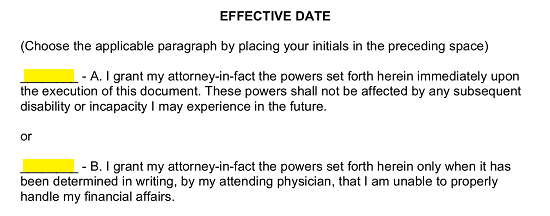
4 – A List Of Individual Principal Powers Require Principal Review And Approval
Oftentimes, the Principal delegating Principal Powers may not wish to deliver the full scope of his or her Authority. That is, he or she may wish the Attorney-in-Fact to have the Principal Authority to affect decisions and changes in some Principal Affairs but not all. In this spirit, a list of different types of Authority has been constructed for the Principal’s Approval. Each item presented under the bold title “Powers Of Attorney-in-Fact” is a classification of Principal Authority with a description of Principal Agent Decisions and/or Actions. If the Principal wishes the Agent or Attorney-in-Fact to wield Principal Power regarding a specific Power Type, he or she will need to initial the blank line placed just before that classification and description. To exclude a Power, the Principal simply needs to leave the unwanted delegation unmarked
Financial transactions such as receiving and depositing funds in financial institutions can be conducted by the Attorney-in-Fact using the Principal’s Name and Principal Authority, if the Principal initials the blank space that precedes the label “Banking.” The Attorney-in-Fact can Access and Control a “Safe Deposit Box” with the same Authority the Principal holds if the Principal initials the second item.
The Attorney-in-Fact can Access and Control a “Safe Deposit Box” with the same Authority the Principal holds if the Principal initials the second item. The same “Lending Or Borrowing” functions handled by the Principal can also be performed by the Attorney-in-Fact as per the third paragraph’s wording. If the Attorney-in-Fact is to be designated with the Principal Authority to behave in this manner while wielding Principal Powers, then the Principal will have to initial the blank space associated with this description
The same “Lending Or Borrowing” functions handled by the Principal can also be performed by the Attorney-in-Fact as per the third paragraph’s wording. If the Attorney-in-Fact is to be designated with the Principal Authority to behave in this manner while wielding Principal Powers, then the Principal will have to initial the blank space associated with this description The next classification Principal Authority listed here is labeled “Retirement Plan” and will declare the Principal Agent will be able to use such Authority to make, maintain, decide upon, and perform various actions with the Principal’s Retirement Plan or IRA. This excludes any Power to change a Principal’s beneficiary.
The next classification Principal Authority listed here is labeled “Retirement Plan” and will declare the Principal Agent will be able to use such Authority to make, maintain, decide upon, and perform various actions with the Principal’s Retirement Plan or IRA. This excludes any Power to change a Principal’s beneficiary.  The Attorney-in-Fact can “Complete And Sign Any Local, State And Federal Tax Returns” and perform a host of other actions on behalf of the Principal when dealing with Tax entities. The Principal must initial the blank line placed before the “Taxes” label to grant these Powers to the Agent if he or she wishes the Agent to act in this way. This will not necessarily satisfy a Tax Institution’s requirements so if this classification of Powers fall under the Agent’s Principal Authority, contact appropriate Tax Entities for more information
The Attorney-in-Fact can “Complete And Sign Any Local, State And Federal Tax Returns” and perform a host of other actions on behalf of the Principal when dealing with Tax entities. The Principal must initial the blank line placed before the “Taxes” label to grant these Powers to the Agent if he or she wishes the Agent to act in this way. This will not necessarily satisfy a Tax Institution’s requirements so if this classification of Powers fall under the Agent’s Principal Authority, contact appropriate Tax Entities for more information  The Principal’s “Insurance” can be controlled by the Agent on behalf of the Principal. If the Principal wishes to allow the Agent to perform actions such as purchasing/paying for premiums and making “Claims On Life, Health, Automobile And Homeowner’s Insurance.”
The Principal’s “Insurance” can be controlled by the Agent on behalf of the Principal. If the Principal wishes to allow the Agent to perform actions such as purchasing/paying for premiums and making “Claims On Life, Health, Automobile And Homeowner’s Insurance.”  The Agent can possess the Principal Authority to decide and take actions regarding the Principal’s Real Estate matters if the “Real Estate” description is initialed by the Principal.
The Agent can possess the Principal Authority to decide and take actions regarding the Principal’s Real Estate matters if the “Real Estate” description is initialed by the Principal. The “Personal Property” the Principal carries Authority over can be conveyed to the Attorney-in-Fact when the Principal initials the empty line attached to the label “Personal Property.
The “Personal Property” the Principal carries Authority over can be conveyed to the Attorney-in-Fact when the Principal initials the empty line attached to the label “Personal Property. If the Attorney-in-Fact must possess the Authority to Manage Property in the Name of the Principal, the tenth statement “Power To Manage Property” must be initialed by the Principal
If the Attorney-in-Fact must possess the Authority to Manage Property in the Name of the Principal, the tenth statement “Power To Manage Property” must be initialed by the Principal  The “Gifts” category defines various manners of gifting the Attorney-in-Fact can affect in the Principal’s Name if the Principal initials this category
The “Gifts” category defines various manners of gifting the Attorney-in-Fact can affect in the Principal’s Name if the Principal initials this category  The Principal’s need to obtain Legal Advice and participate in Hearings can be handled by the Attorney-in-Fact if the Principal has determined he or she should be appointed with the Principal Authority to do so. If so, the Principal must initial the final Power Class (“Legal Advice And Proceedings”).
The Principal’s need to obtain Legal Advice and participate in Hearings can be handled by the Attorney-in-Fact if the Principal has determined he or she should be appointed with the Principal Authority to do so. If so, the Principal must initial the final Power Class (“Legal Advice And Proceedings”). The next labeled area, “Special Instructions,” has been presented at the end of this list where any additions, restrictions, or Principal Instructions that should be used to define the Principal Powers designated to the Agent here. The blank lines in this area will allow for this report, however, if you require more room, you may conclude the report on an attachment
The next labeled area, “Special Instructions,” has been presented at the end of this list where any additions, restrictions, or Principal Instructions that should be used to define the Principal Powers designated to the Agent here. The blank lines in this area will allow for this report, however, if you require more room, you may conclude the report on an attachment
5 – The Executing Signature Of This Paperwork Can Only Be Supplied By The Principal
The Principal must supply the exact Calendar Date he or she will sign this document to put these Powers in Effect. This information should be supplied as a Calendar Day, Month, and Year across the first, second, and third blank spaces in the last statement here (“In Witness…”). This paperwork will be concluded with the Signature of the Principal. This action must be performed before a Notary Public. The Principal must sign the blank line beneath the Signature Date statement.
This paperwork will be concluded with the Signature of the Principal. This action must be performed before a Notary Public. The Principal must sign the blank line beneath the Signature Date statement.
The Notary Public has been provided with a defined portion of this page for his or her use in notarizing this document. 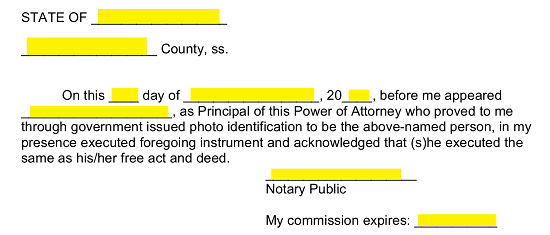 The last page of this paperwork requires the Printed Name and Notarized Signature of the Attorney-in-Fact. He or she should sign the paragraph labeled “Specimen Signature And Acceptance Of Appointment” after his or her Name has been printed where requested in the paragraph itself.
The last page of this paperwork requires the Printed Name and Notarized Signature of the Attorney-in-Fact. He or she should sign the paragraph labeled “Specimen Signature And Acceptance Of Appointment” after his or her Name has been printed where requested in the paragraph itself.  The Notary Public will use the area below the signature to notarize this portion of the paperwork.
The Notary Public will use the area below the signature to notarize this portion of the paperwork.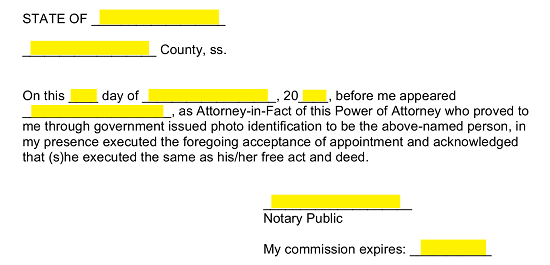
Related Forms
Download: PDF

